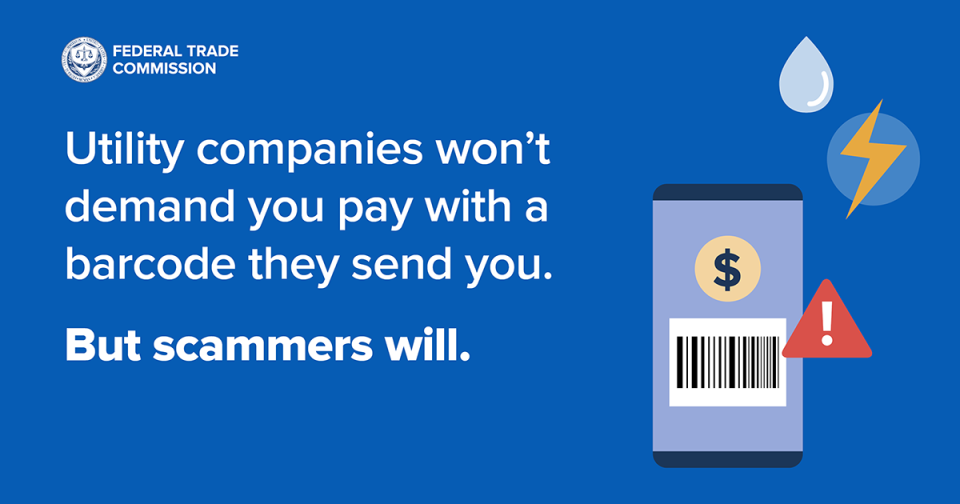Getting an urgent call from what sounds like your utility company might make you think: Did I forget to pay my bill? The caller says there’s a way to avoid shutoff and fees: they’ll send you a barcode by text or email so you can pay at a local retailer like Walgreens, CVS, or Walmart. Don’t. It’s all a lie. Wondering how to know it’s not a real utility company calling?
Scammers call unexpectedly and create a sense of urgency. But real utility companies don’t do that. Even if you owe money, they’ll work with you on a payment plan and won’t try to scare you into paying immediately — and they won’t send you a barcode and insist you take it to a store to pay.
Here’s how to deal with calls or messages that appear to come from your utility company:
- Contact the utility company yourself. If you’re worried you might be behind on your bills, call the company using the number on your bill or the utility company’s website ― never the number the caller gave you, which will lead you back to the scammer.
- Know only scammers demand you pay a certain way. Scammers ask you to pay in a way that makes it hard for you to get your money back — wiring money, putting money on a gift card, using payment apps, paying with a scannable barcode or QR code, or cryptocurrency. Your utility company won’t demand you pay that way.
- Act quickly if you suspect you paid a scammer. Contact the company you used to send the money and tell them it was fraud. Ask for their help to reverse the payment. You might be able to recover some of your money.
Report utility company impersonators it to your utility company and to the FTC at ReportFraud.ftc.gov.


the first clue that it's a scam is the fact that the utility companies don't call. i'm not scanning bar codes, qr codes or anything else. if i need to contact my utilities company, i will call the number on the bill or go directly to their website. (an not thru any links i get in email.)
These scammers should get life in prison.
In reply to These scammers should get… by Lowell Deer
I received a call from a person who said they were calling from Seattle City Light.
They said I had an outstanding bill and they would take care of it over the phone with a debit or credit card, or my electricity will be shut off.
I said, "You're a scammer aren't you?"
They insisted that they weren't a scammer, but I told them off and hung up.
I called Seattle City Light to let them know and I called the FBI and gave them the number the scammer was calling from.
Unfortunately, there is nothing they can do, because they aren't in the U.S.
That really sucks!!!!
Very good information. Thanks for sending it.
Thanks.
They might send emails telling you your service will be cut off,too. I keep getting emails from someone pretending to be from Xfinity/Comcast. They are not usually considered a utility, but it seems like a similar type of scam. I have noticed two things that seem odd to me. First is the email address from which they are sending the email. It is not an Xfinity/Comcast email. Second, they are sending the email to me using an email address that I never use to email Xfinity or Comcast.